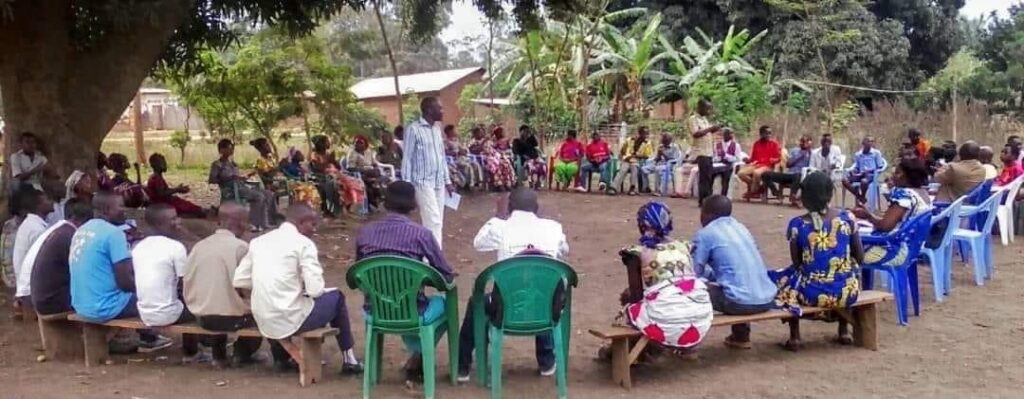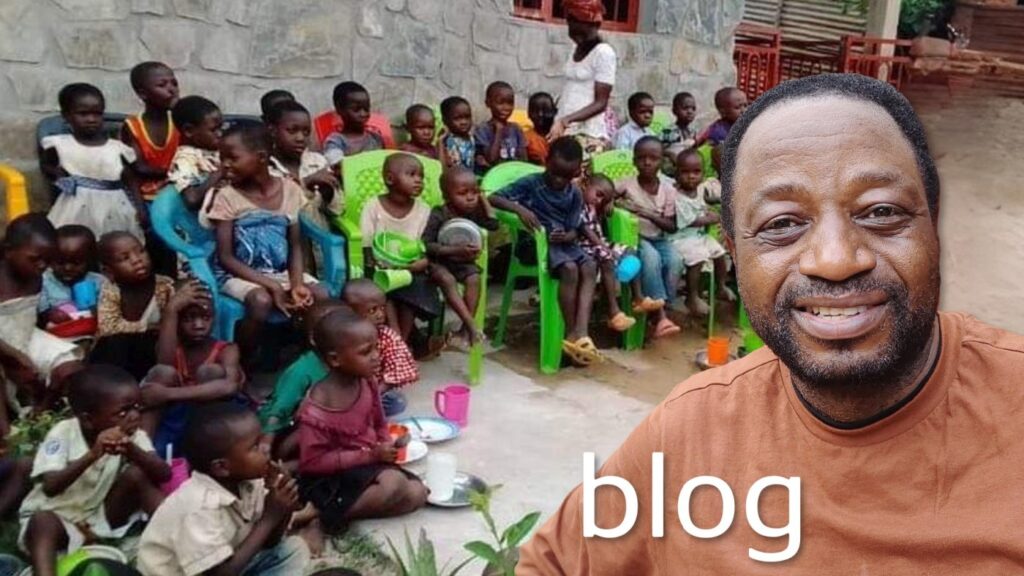Today 20-06-2024 is World Refugee Day!
This year’s focus is on solidarity with refugees – for a world where refugees are welcomed.
According to the UN, in May 2024, forced displacement rose to 120 million people!
On this special day, we share the story of a refugee from the Democratic Republic of Congo. (DRC). Eric, who was born in a multicultural society in Kivu in the Democratic Republic of Congo, witnessed ethnic harmony turn to violence in 1996 when his cousin’s family and many others were killed. This and his father’s guidance inspired him to promote unity and to become an advocate for peacebuilding and Ubuntuism. He co-founded CEEDECO in 1997, an organisation that creates safe spaces for diverse communities to resolve conflicts non-violently. With the Movement for Humanism Actions (MOV-HUMANA).
Eric and his team aim to spread Ubuntu education.
Learn more about the background and the reasons that motivated Eric to start his organisation:
By Lukemya Eric Wa Mwenge
The Tragic Tale of Abas Mukandama
Abas Mukandama, my cousin was a man in his thirties, when Abale, a small village at the junction of Fizi and Mwenga territories in a mountainous region in the South Kivu- DRC was attacked by armed men from an ethnic group on the 5th September 1996 and with the sounds of the bullets, Abas and his family decided to flee and hide in a bush near their house. Unfortunately, they could not be aware of their murder the following day. The day before the massacre occurred, Abas’s two good-looking boys 8 and 10 years old got sick of malaria in the bush where they were hidden.
A Desperate Search for Safety
Since the situation of his two sick children worsened in the bush, he decided to go with the whole family to the health center. The family needed to be together during such crises.
The health centre was located in a neighboring village close to Abas. The main nurse of the health center, Thomas, was from a different ethnic group, but he was his friend. With full confidence that his friend would protect him and his entire family and treat his kids, Abas decided to leave the bush to visit the health center despite the visible insecurity in the village. As expected, Thomas was happy to see Abas and his family and invited them to stay in his house while he treated the children immediately. Despite the friendship between Abas and Thomas, suspicion increased due to the movements of armed men in the village. Abas feared that Thomas, as a civilian would not be able to riposte any potential attack. Abas decided to take his family to another village belonging to his wife’s ethnic group- the Banyindu tribe.
A Night of Horror
Unfortunately, at 7.00.pm while the villagers were having their dinner together with their guests, a terrible event occurred. Armed men from the Banyamulenge or Tutsi ethnic group attacked the village to the point of killing everyone who was found there, including Abas, all 6 children and his wife, Anastazia.
The massacre of the peasants in Abale, on the 6th of September was the beginning of the civil war between ethnic groups on the high plateaus of Uvira and Mwenga. The war of Banyamulenge against their neighbors.
A Cycle of Retaliation and Destruction
This massacre was a retaliation: Armed men in Abale village had heard that another militia from the Babembe ethnic group went to massacre their families in Bibokoboko, a village located about 70 km away from Abale. Unfortunately, no single person escaped the attack that evening.
After committing this barbaric massacre, the militiamen immediately returned to Bibokoboko. The next morning villagers from Thomas village, while going to their farms, not knowing what happened at night, were shocked with what they found. Instead of finding their neighbours whom they wanted to say hello to, they found hundreds of corpses. Among them, Abas, his 6 kids, and his wife’s were slaughtered like animals in a butchery. The farmers went back to tell other villagers about what had happened. Only a day after the news had spread in the region, revenge attacks started. In Baraka, in the Fizi territory, the Babembe tribe attacked neighboring villages belonging to the Banyamulenge/Tutsi tribe. Entire villages were burnt up, the livestock and farms destroyed, women and children were raped and many of them were killed.
Fleeing for Survival: The Exodus to Refugee Camps
As a result, entire villages on the High Plateaus of Uvira, Mwenga and Fizi were emptied, those who survived fled to refugee camps in Burundi, Rwanda, Tanzania, Kenya, Uganda, Zambia or to Internally Displacement People’s camps in the DRC that were setup under the UN mission protection. Many people were displaced to the nearest towns, such as Uvira, Bukavu, Baraka, and Goma.
Among those who fled to Uvira were Abas’s parents, back then in their 70’s and disabled having low vision and being chronic diabetics. The senior couple had been abandoned by everyone, including the local authorities and started living without any form of support in the slum of Kiyaya in Uvira.
A Community in Crisis: The Aftermath of War
Many other families, single women, children, and non-accompanied youngsters were found in the slums of different towns, hopeless and homeless. Many youngsters could be seen committing crimes, smoking hashish, or selling stolen goods. It was common to see fire weapons in the hands of adults, youth, and even children. All such activities and movements were occurring near our office. This led to the idea of supporting Abas’s parents.

Restoring Hope: Creating Safe Spaces for Healing
Our volunteers interviewed late Abas’ parents about what could be done to assist them. The seniors said what they needed the most was not food or clothes, but the recovery of their souls. Our colleagues expected the need of provision of shelter and basic necessities such as food and clothes, but now it was clear, that what was needed was a meeting space for senior internally displaced persons, children, and youth a recreational space.
After a long time, smiles started to be observed on the faces of older people. Children started to appear more joyful. Young people who were in the streets became curious to see the games that children were playing. Then we asked them if they would like to join and volunteer. Some accepted and ed the pool of volunteers without any prior training. These former young street children started to be engaged in art programs, drawing, dancing, singing, or cleaning our gardens at our headquarters.
The Need for Skills: Preparing for a Better Future
But a lack of skills and competence made many of them abandon volunteering.
In this context CEEDECO is thinking of a tailor-made learning program for those affected by recurrent wars in the region through Ubuntu Academy. Two premises are already available.
The next goal is to start a regional peace-building centre that promotes the Culture of Ubuntu in the Great Lakes region.
Eric is one of 24 change makers from 12 countries who is at kanthari to acquire tools and skills that will enable them to run organisations addressing social and or environmental issues.
Learn more about about kanthari at www.kanthari.org
Do you, like Eric carry a plan to bring about positive change in your community? And are you looking for a place to acquire skills and tools? Then the kanthari impact leadership course could be the right place for you. The next course starts in April. Visit https://www.kanthari.org/admissions/ and apply. Thank you for further sharing this information so i reaches change makers anywhere!



